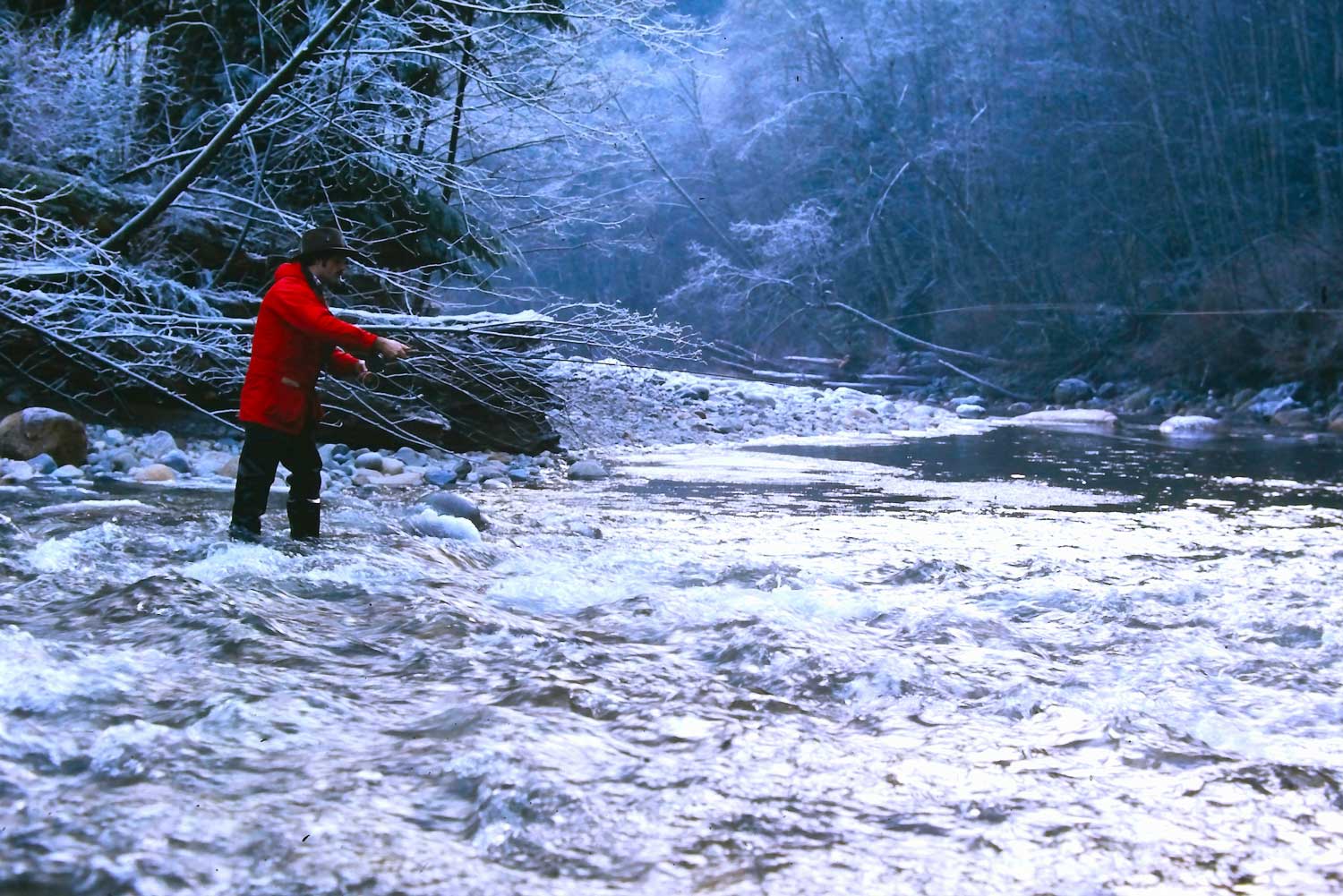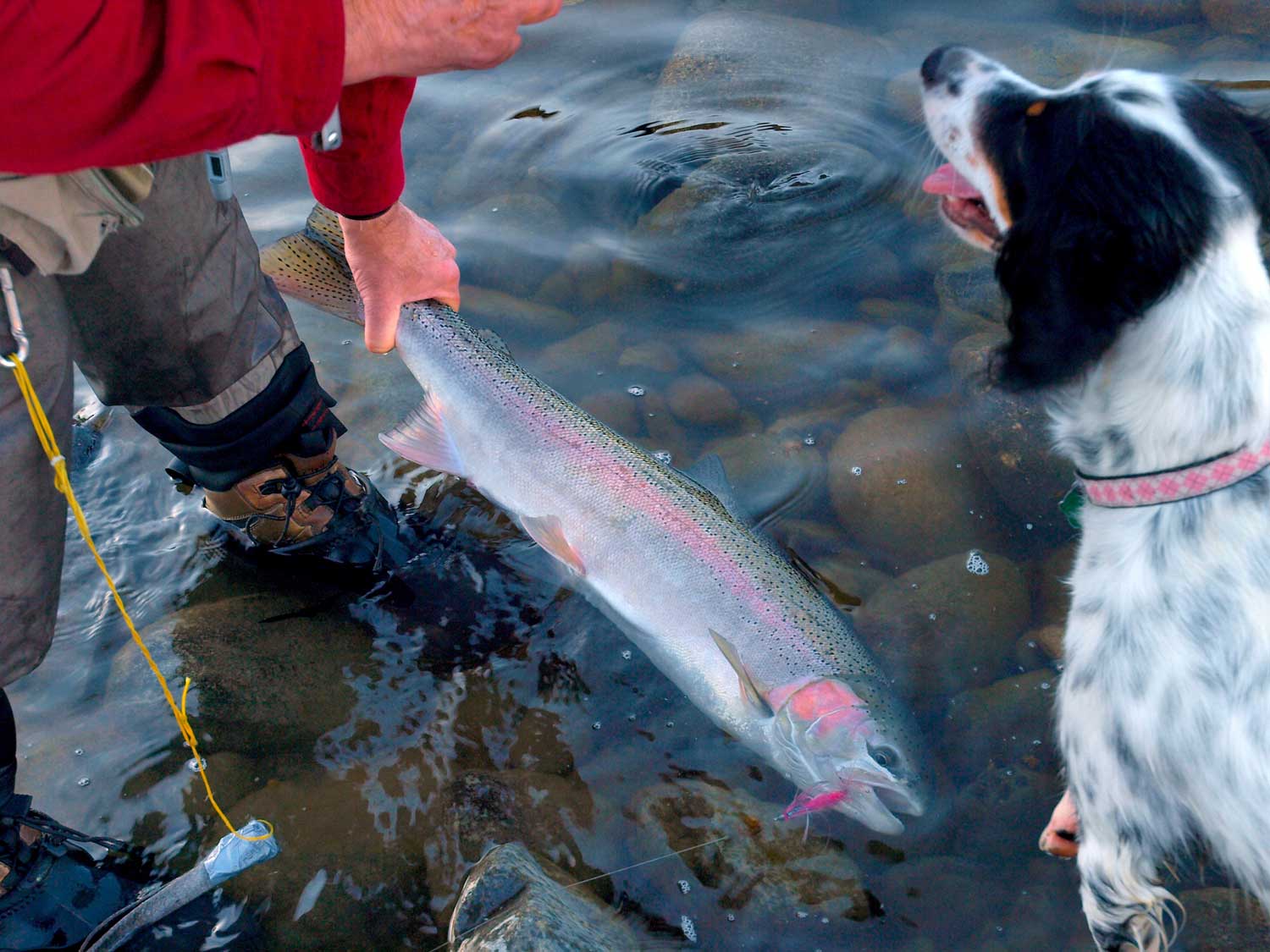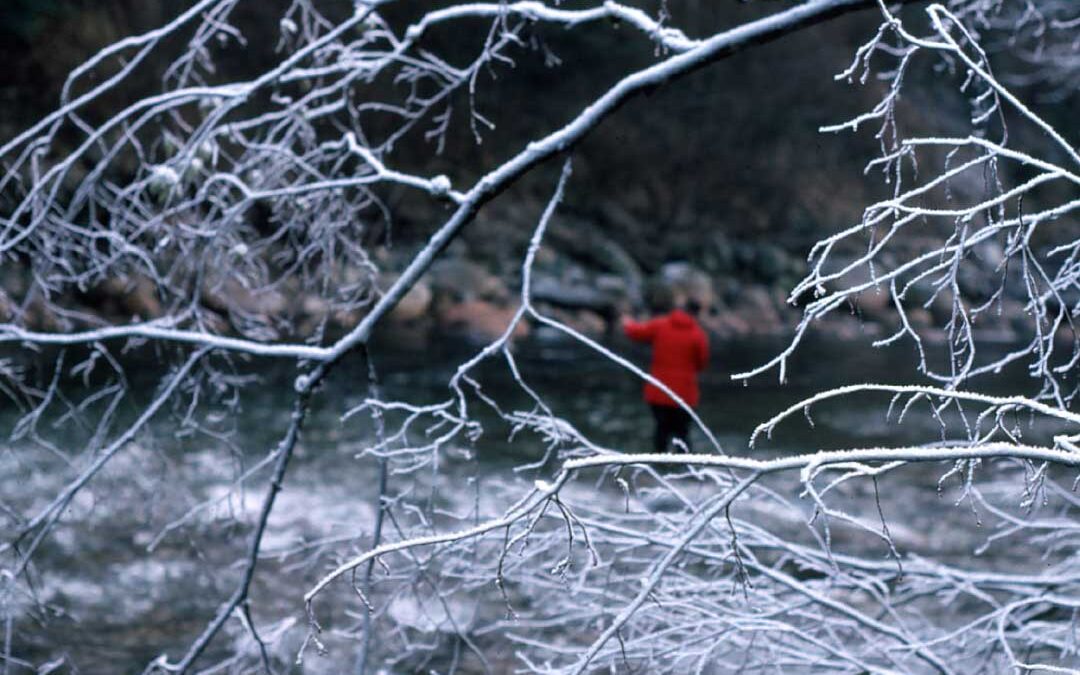I parked in the cul-de-sac where the suburban world ended. Unhitching my rod from the roof of my pickup, I crossed the bridge over the thundering creek and walked past the pump housing that the cougar liked to lie upon in the midwinter sun. Once again, I had passed through the looking glass. Waving to the watershed guard in his tiny Sea-Can office, I entered the trail through the grove of ancient cedars. The silence of the rainforest swept over me. Then a movement at the Cathedral Pool caught my eye.
I watched the old man, a barely discernible apparition in the shadows, cast gracefully from his perch on the cliff. The thin amber light of December filtered through the great trees, faintly lighting the moss-covered rocks and shimmered down his line to the white float that drifted haltingly through the current. He watched transfixed heron-like. The float halted for barely a moment, and he struck. The float plunged and the line knifed downstream, the center-pin reel whirring soundlessly. He applied steadily increasing pressure as the fish turned the corner. Then the line came back, slack. Slumping, the man wound in his line. He carefully examined the hook and flicked a couple of scales from the lure. Then he looked up at me smiled sheepishly and shrugged. I held up my thermos hoping he would join me. He did.
The strong comforting aroma of coffee laced with whisky mixed with the damp, wood-smoked wool of the man’s green and black checkered jacket. For a time, camp smell masked the musky, sickly odor of dead leaves and dying salmon—signs of winter on the coast. He was a small man with the faint aura of a previous era, a melancholy, deeply lined face and the swollen leathern paws of a logger. Someone you wanted on your side when they chose up sides in the bar. His eyes were the quick, curious, vulnerable eyes of an ancient child, almost transparent, an old soul who had seen a lot, but not yet had his fill.

He told me he’d grown up here, hiking to the river from the cove where his family lived in a floating house moored to the government dock. He had become a deadly fisher, probably killing too many fish, he lamented, but their numbers seemed infinite, and he kept his family in fresh meat when times were lean during the winter. He’d joined the army, met a girl from Maine and moved there after the war because she wanted to be near her family. He liked her family. He didn’t want to talk about his own, his face darkened when I asked whether he had fished with his dad, and he said nothing.
He went on to tell me that his children had grown, then his wife, his life partner and sweetheart, had died. He had found himself alone in an old country where he was still an outsider. He paused. I waited in silence then he went on. He’d come home, back here to capture some magic and to fish the river of his youth. His friends, however, were dead. Recently he’d taken over a squatter’s cabin on the flats, next to some “hippie” kids.
I told him I had come from the East as well and had fished Atlantic salmon but had never caught a steelhead. He said he had given up fishing back East—the season conflicted with logging and besides he could never get into fishing with a fly and everything else was regarded as poaching.
I probed him with a hundred questions about the river. At those inquiries, his face brightened, and he began telling me about this mountain stream, before the dam, before the watershed authority had closed it off. There were settlers here, even a store and a farm, ironically more people than today, when all but a few survivalists had been evicted, and more fish. Many more. Certainly more spawning area because the river could recruit gravel from the upper reaches.
With each new story, his face increasingly became that of a young boy’s exploring the river, learning its secrets, eager to tell me what he knew. That is what I had hoped for—like the old trappers and prospectors I used to hang out with as a kid. We were going to become good friends.
Regrettably, I had to stop him as the light was failing. It was Christmas Eve I pointed out, and I had, with some admittedly unjustified bravado, promised my family and friends a steelhead to go with the chukar partridge and venison of our annual game dinner.

Where would he go if he had to take a fish on the fly? On the fly? A winter steelhead? A dubious proposition at best, he retorted shaking his head. But there was one place, the third cribbing below the island, right opposite the leaning tree where the pool, no more than six feet deep, always held a steelhead at this time of year. The water at the moment wasn’t too high; I might have a chance on the fly. But why, he pondered, would a man who had to bring home a steelhead at this time of year, restrict himself to the fly?
I explained that I had tried using a center-pin reel, a Silex, still had one, but when I couldn’t catch a steelhead had reverted back to the fly. Chuckling, he said it was lucky my family didn’t have to rely on my fishing for survival.
We said our goodbyes, then I turned back to him and asked whether he would like to come to dinner tonight, in the cove not far from where he grew up? He hesitated, then he brightened. What could he bring, he asked? I replied he need bring nothing, that he would be the guest of honor. He insisted that he must bring something, and I replied that it was his call.
I waved and started to move through the young cedars and salal bordering the path. Looking back, I realized he had already disappeared. Snow began falling, intensifying the silence.
I now saw the valley through the old man’s eyes. I spotted the remains of the sluice, the shingle bolt pool where they used to run cedar logs for making shakes, where the houses stood on the slopes, the overgrown pasture of the farm and the leaning gate, the remains of the old Model T Ford and the crumbling cribbings.
The Elbow Pool looked promising but too deep for the fly. The first cribbing had deteriorated to pocket water and the second looked promising, but I had time to fish only one pool.
Fifteen minutes later I saw it—a throat of tumbling water breaking against a large, submerged boulder and streaming into a riffled belly and long gliding tail. I crossed at the tailout of the pool above, just below the long, straight cedar log. Any more water and I wouldn’t have been able to.
I walked down to the head of the pool just opposite the old cribbing and upstream of the overhanging tree. Unfurling my line, I entered the river pausing to tie on the fly the old man had recommended. I didn’t have a Thor, so he had pointed out one I had been experimenting with. The pattern was a pink, fluorescent bicycle tape and polar bear hair concoction I had playfully named the Davie St. Hooker—the name had brought a smile of recognition to his lips.
Finally, I began to cast, lengthening my line after each swing. I took only one step after each cast, drifting my fly through the holding water, a much slower pace than I normally allowed. After dinging the boulder on a pass, I mended less. Nevertheless, 15 feet downstream I became snagged. My dilemma was that I was in prime holding water so rather than flicking the rod to dislodge the hook, I reefed back on the rod to break off.
My line gave grudgingly, heavily. A waterlogged branch set adrift? Not at all! A 15-pound buck steelhead shattered the surface. One long burst downstream, another up through the chute and several thrashing short runs later he lay panting in the shallows, his enflamed blood-red flanks glowing brightly in the dim light. A late October summer-run.
I had my Christmas Eve supper steelhead course. But I knew that although the law still allowed the killing of one, that unlike winter-runs that numbered near a thousand, there were fewer than a hundred wild summer-run steelhead returning to the river. I looked at him as he regained strength, the outrage in his eyes intensifying. He wrestled free from my grip then paused, and slowly swam into the depths.
What was I doing? I could have grabbed him! What would I tell my wife? What would I tell my new friend? I was once again, snared in an absurd dilemma. Yet I felt very much at peace as I walked down the trail to the gate. The river needed him more than I did.
From the corner of my eye, I spotted an eagle creaking off from a high tree branch where it had witnessed the whole episode. Shaking its head? Snow continued to fall muffling my steps, cloaking my thoughts.
I was back near the Cathedral Pool. Dark had fallen, but the mantle of fresh snow gave off some light. I expected the old man to be long gone; then I saw a figure sitting on a bed of moss, slumped against a tree asleep. At his side lay a freshly minted winter-run steelhead incandescent in the false light.
As I approached, I grew concerned. He didn’t stir. No breath showed in the cold air. But there was no snow on him, and his face was serene. A great sadness overcame me. I ran to the guard’s hut. He dropped his magazine at my pounding on his door. I breathlessly told him a man had died at the Cathedral Pool. He looked at me curiously. Without waiting for an answer, I turned to run. He followed in his shirt sleeves.
The snow had stopped. The steelhead shimmered under a moon newly emerged that bathed the forest in light. The river writhed far below, a silver living creature. But my friend was gone.
“Nice steelie you caught there,” commented the guard drolly. “A bright winter-run.”
“But I saw him, an old man lying against that tree.”
“You’re a week late,” said the guard. “They found an old fellow lying there dead from a heart attack, a fish still on his line.”
The guard shrugged and headed back to his hut. I lingered a bit deep in thought before picking up the fish and heading back to my truck.
“Thanks, old friend,” I muttered to myself as my boots crunched through the snow. I will be back next Christmas Eve to fish the Cathedral Pool, and so, I hope, will you.”
This article originally appeared in the 2023 November December issue of Sporting Classics magazine.

